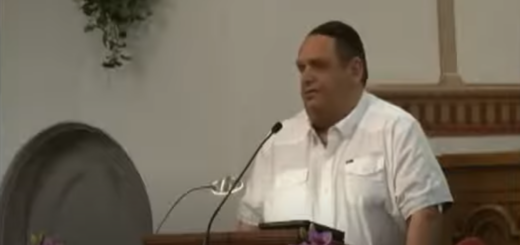Curses in our lives. A short conversation.
In this audio presentation, Alexander Blend reflects on the concept of a curse in the context of the weekly Torah portions Balak and Pinchas. He explains three Hebrew words that denote different types of curses:
klalah (a frivolous or disdainful attitude toward one’s own or another’s talents and worth),
me’ara (a curse through an excess of blessings or opportunities that one cannot bear), and
nakov (a curse through the disclosure of hidden or shameful aspects of human nature, associating sin with human nature).
Alexander Blend provides numerous examples from life, Scripture, and personal experience, showing how each of these types of curses can manifest in everyday life and cause spiritual and psychological damage. He emphasizes the importance of being careful in assessing one’s own capabilities, respecting the gifts given by God, and maintaining modesty and purity in speech and actions. He concludes by blessing the audience for health, prosperity, and spiritual well-being.
Transcript to this talk:
Shalom, dear friends, with you is Alexander Blend.
The weekly chapter Balak and Pinchas is a good opportunity to talk about curses, about how we ourselves can inadvertently bring a curse into our lives and into the lives of those around us. No, we are not talking about some kind of mysticism, we will try to do almost without it. There are three words in the Torah that mean curse. The word “kalla” comes from the root “kal” – light, worthless. When we neglect some abilities, opportunities of ours or those around us. When we neglect our own dignity or the dignity of those around us.
Say we have a child growing up, and he has a talent for music or drawing, but we say, why would you be an artist? Where are you planning to go to art school? Go to animal care school, it’s nearby and easy to get in. Where are you going to study? Where are you getting up? What are you aiming for? You will never be able to become, or I will never be able to become. What about you, what about us, neglecting some God-given talent? Often we do not want to see these talents, these abilities in children, because we want to develop something else in them. We failed to become someone. We want to become a ballet dancer, and we want our daughter to dance ballet. Maybe she doesn’t want it at all, but wants to draw, but we want it this way, and we ignore her talent for drawing from God. We neglect some of her abilities, some of her potential. We ourselves can neglect some of our potential, and this is “halalah”.
When we are heavy, weighty, in Hebrew “Mikubad”, worthy, we make “Mikulal” – despised, we turn God’s dignity into something despicable, and thus we unwittingly bring a curse into our lives and into the lives of our children. When we neglect what God gave them, what can manifest in them, make them happy, fulfilled people. I think everyone will find many examples of how this works in their lives and, perhaps, how it works in the lives of the people around them. When we block the way for God’s blessing in our lives and in the lives of our children. In the 49th chapter of the book of Bereshit (Genesis) we read when the forefather Jacob blesses his sons. In verse 28 we read, “he blessed each one according to his blessing.” That is, he blessed what his children were already blessed with. He blessed the abilities they had, the character traits they had. Where the divine light was manifested in them, there he blessed them. This is very important: to bless where our child is already blessed.
Another example of when we neglect our own dignity. Say we found ourselves in a line where everyone was pushing and shouting. At first we stood quietly, then suddenly we got infected with it, started pushing and shouting. We are used to keeping clean and throwing papers only in trash bins. But when we find ourselves in a littered place, a place where there are houses with broken windows, we also start throwing garbage right under our feet. We adopt speech from those with whom we communicate. If we suddenly find ourselves in an environment where speech is impure, then we can also pick up this impure speech. You can neglect your dignity and make yourself light, so that it is easier. This is also a curse of exactly the same type. So, the word “kalala” comes from the word “kal” – light in weight. Another word for a curse is the word “me’ara”. It comes, oddly enough, from the root word for “light” – “aleph (א) and resh (ר) (Hebrew Letters)”, the Hebrew word “or”- אר. Too much light can turn a blessing into a curse. When we are, so to speak, blessed with what we cannot bear, when we are burdened with what we cannot perceive. In chapter 28 of the book of “Deuteronomy” it says this: “You shall betroth yourself to a wife, but another husband shall lie with her.” “You shall build a house, but you shall not dwell in it.” “You shall plant a vineyard, but you shall not cultivate it.” “Your ox shall be slain in front of your eyes and you will not eat any of it.” So you have a wife, you have a house, you have a vineyard, you have an ox, you have a donkey, you have sheep, but you cannot receive a blessing from any of this, because you do not have a vessel to contain this blessing. There are situations, usually this happens in eastern countries, when a little girl is married at 7 years old, at 9 years old, at 13 years old. It would seem that, of course, marriage is a blessing for a woman, but at this age it turns into a curse for her. It happens that a girl dies, commits suicide, and if she lives, then her life is ruined. This is “me’ara”.
A kind woman once wrote to me and said, I have a tithe saved up, ten thousand dollars, and I have drug addicts living nearby in an abandoned house. Maybe I should give them this ten thousand dollars? And they will start a new life with this money. What do you think? I wrote to her, this money can kill drug addicts, without having any tools to start a new life with this money. They will simply spend this money on drugs, possibly in such doses that they will die. Money that for others would be a blessing for these unfortunate, confused people can destroy them. Drug addiction. Early marriage. This can be a very radical example. But digging into life again, you can find how this works in our lives. That is why King Shlomo (Solomon) said: “Remove vanity and lies from me. Give me neither poverty nor wealth, feed me with my daily bread.” Why not give me wealth? Because wealth, even for a person free from drug addiction, can be a curse. Both fame and power for which a person is not ready, can also be a curse for a person.
It also happens that a person worked, succeeded somewhere, for example, a good surgeon, a surgeon from God. Indeed from God, because it is God who gives talent. And they promoted him, first made him the Head Physician of the hospital. He got an administrative job, which he doesn’t cope with very well. And then he is even more blessed. He becomes a minister. And as a Minister of Health, he may prove incompetent. Here is a blessing that turned into a curse. An abundance of light that turned into darkness. A man started building a house for his family, but he started building a huge three-story house. He took out loans for this money, the bank even blessed him with loans. In the end, he cannot finish this house. For years, the house is not worth enough. The children grow up, but it is not built. And maybe the man would have built a smaller house earlier. But he himself brought excessive light into his life. This happens in our lives too. Therefore, when people ask for some glory or some money, you also need to be careful. Not any money, not any new appointment, not even any service. We can be careful. We can endure. And this is the meaning of the second type of curse, the word “miara” and how it manifests itself in our lives. We must make a reservation. Of course, a person should strive for more. Otherwise, he will fall under the curse we talked about at the beginning. Of course, a person should strive, aim, dare. All this must be done. But you need to measure your capabilities. And you need to pray constantly so that what we receive, where we grow, where the Almighty brings us out into the open, would be a blessing for us.
The third word we are talking about is the word “nakov”derived from the word “linkov”. “To call a spade – a spade”. You can associate this verb with the word “linkov”. To perforate, to make a hole in order to bring something to light. It would seem like: What is so scary about this? The sages say that everyone knows where and why the bride is taken on her first night. But the one who speaks about it outloud is cursed. There are some things, some actions that we do that are not customary to talk about, that are customary to do in modesty. These may be some of our natural things, natural needs. These may be things that we are ashamed of. They are in us. We work to overcome these sins, these problems, but we are ashamed of them. We do not associate ourselves with these sins of ours, with these problems of ours that we are trying to overcome. In the last week’s chapter, we read how Belam says how he could curse, if God did not curse. Here he uses this very word “nakov”. How can I declare something to be their nature, connect something with their nature, if God did not do it?
Rashi Rabbi ShlomoYitzchaki, one of the commentators, says here: How can I curse, if God did not curse? Even when they deserved to be cursed, when their nature was somehow revealed, they were not cursed. When their father Jacob mentioned their sin, for in their heat they killed the husband. He cursed only their anger, as it is said, “cursed is their anger”. About Father Jacob, blessing his children, he did not say “you are angry” and connected anger with the nature of the brothers. He cursed only their anger, not them themselves. And “nakov” is a curse when they curse something, calling it the nature of the curser.
We can all have some sinful thoughts, sinful desires, something that sometimes amazes us, where did it come from in us. The depth of what happens in our hearts, sometimes it is just a deep abyss. But we are used to being ashamed of it, embarrassed by it, hiding it, concealing it and trying to overcome it. It is natural to be sensitive to this. That is why we are so embarrassed by foul language, when we are called by their direct names the names of some organs that are not usually named, and for which we have euphemisms, some activities for which we have euphemisms, they are not usually named directly.
I witnessed a situation when in a psychiatric hospital in Jerusalem, a female doctor, was making her rounds. Her students and other doctors of the hospital were around her. And one patient says: “Why did you come here to examine me? Today you did this, this and this with your husband.” And there is nothing shameful in what she did with her husband, whatever it was. But this creates some kind of constraint, some kind of stiffness inside, which says, this is your nature. You are not really pure. You really have nothing good in you at all. This feeling can be born. So obscene language makes us unclean, often constrains us. And when we read about what one of the sons of Israel did, who came and brought a woman from Medyan to his brothers, in front of Moshe (Moses) and in front of all of the community of the sons of Israel, they cried at the entrance to the Tent of Meeting. And Phinehas son of Eleazar, the son of Aaron the priest, and he arose from among the congregation, and took a spear in his hand, and went in after the man of Israel into the tent, and pierced them both, the man of Israel and the woman in their womb: and the plague was stopped among the sons of Israel. A note must be made on the translation of the word which is translated here as tent, “kuba”. It is actually a “brothel” or “den”, derived from the same origin. A place where one can be oneself, where one can simply call everything by its proper name, be who one is. All this is said with a grain of irony and sarcasm, of course. What happened here? The man came before the eyes of all Israel. He is not embarrassed by anything here, he is not ashamed of anything here. He says “yes”. “Did you really not look at these Meditian women? Did you really not think about them? Yes, you all want them. You all want to be with them. You are all as lustful as I am. But I am the only man here.” And all of Israel cried. Cried, because hearing such a thing is truly a very bitter feeling.
Why is Moshe inactive? Why is Moshe silent in this situation? Midrash (Hebr. “interpretation”) speaks, describing such a dialogue between this man and Moshe: And he says to Moshe: “Is this Meditian allowed for me or forbidden?” Moshe replies: “Of course she is forbidden.” “And you yourself, Moshe, aren’t you married to a forbidden woman? You are all the same, you are all the same!” the man says. The man continues: “Come on, what are you pretending to be noble here, that you are pretending to be believers, inside you are all the same, you are all rotten!”. You often meet this in life. “Are you against pride parades? Are you homophobic? No, you are not homophobic, you are a latent homosexual. You are just ashamed of your homosexuality, that is why you fight against it, but in fact inside you are the same as us.”
This is what this curse “says”, which binds you, which tries to tell you that you are unclean, that you also have this and that you are the same. “This is your nature, which you are hypocritically embarrassed of, pretending, you are righteous!” And in our lives we also encounter this, when they tell us: “Come on, why are you pretending to be righteous? Come on, why are you acting like this? At least I am not embarrassed, at least I am honest, and you are not only a villain inside, you are also a hypocrite. All your righteousness is hypocrisy!” It is a “fishing rod” that is very easy to be caught with. It is very difficult to remember that righteousness is our new nature, it is our nature, and the sinfulness that we have, the impurity that remains in us, is passing away, dying, that which we will overcome and move on. It is very difficult to remember that we must associate ourselves, compare ourselves precisely with righteousness, and not with the impurity that is in us, when they tell us: “Come on, we are all like that, you really want this? Well, allow yourself, well, don’t be a wimp, don’t be righteous!” And this is the case when you shouldn’t argue, use the “Principle of Phinehas” – “take a spear and stop the dialogue”. Well, of course, we are not Phinehas and we can simply stop, interrupt the conversation, we are told not to communicate with those who are called brothers, but are themselves debauchees, covetous or idolaters, slanderers, drunkards, swindlers, “do not even eat at the same table with such people”, do not enter into discussions, do not enter into any conversations, any communication, move away from this, because as soon as you begin communication, as soon as you begin to speak, you will begin to speak with the same vocabulary, you will let it into yourself, you will allow yourself to be what you are called. This feeling of one’s own impurity will create constraint, sometimes it can paralyze and it may came to pass that long ago somewhere in the depths of you only, sometimes a thought manifests itself, only for some moments it emerges, suddenly it will gain strength through this curse, will begin to fight for survival again, will rise from the dead in you again. In any case, this is paralysis, this is impurity, this is not the freedom that is associated with this curse. Move away from this. This is how you will be saved, this is how you will get rid of the curse in your life which is called “nakov”. These are three curses, without any mysticism, they enter our lives, enter our everyday lives. We can pick up one of them and carry it within ourselves. And, of course, we need to be attentive, to look at what is happening around us. This is what I wanted to talk about briefly today.
The Holy Blessed One will bless all those who study His word, seek His will, seek His face.
The Holy Blessed One will bless your families, your husbands and your wives, your sons and your daughters, grandsons and granddaughters, great-grandsons and great-granddaughters.
The Holy Blessed One will bless your parents: dads and moms, grandmothers and grandfathers, great-grandmothers and great-grandfathers.
The Holy Blessed One will bless and support families in need of nutrition, gives decent work so that there is time to communicate with wife and children, to study the scriptures. so that in the household there is prosperity, abundance, the opportunity to help others.
The Holy Blessed One will bless and heal the sick, give wisdom to doctors to heal, will support and strengthen those who accompany the sick.
The Holy Blessed one will reconcile families in which there is no peace, will give peace in the heart and will reconcile fathers and children, husbands and wives, brothers and sisters.
The Holy Blessed One will bless you and your homes and all who are with you with all the abundance of his endless blessings.
Alexander Blend was with you, thank you for listening to me.
May his memory be blessed.






